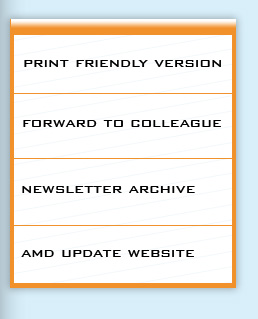

|
December 2014, Issue 76 Gene Therapy: Intravitreal anti-vascular endothelial growth factor (anti-VEGF) agents have revolutionized the treatment of neovascular age-related macular degeneration (AMD). With relatively frequent intravitreal anti-VEGF injections, patients can now expect to maintain and even improve visual function. However, the burden, on both the patient and the health care system, of these anti-VEGF injections is significant. Indeed, several recent studies suggest that patients treated with anti-VEGF therapy are monitored less frequently and receive significantly fewer injections in clinical practice compared with patients in major clinical trials.1,2 These less frequent dosing and follow-up strategies may, in turn, lead to inferior visual acuity results in the real world setting. As such, an intense area of AMD research has focused on sustained delivery of anti-VEGF agents. One approach to continuous delivery of anti-VEGF agents is that of ocular gene therapy. In many ways, the eye is ideally suited for gene therapy: it is a relatively small organ that is immune privileged and has well-defined and well-characterized diseases (e.g. AMD) that benefit from prolonged therapy. The concept of gene therapy lies in delivering a non-pathologic viral vector that carries a payload of genetic information (e.g. RNA or DNA) encoding a therapeutic protein. Once that vector delivers its payload to a specific cell, the machinery inside the cell transcribes the genetic information and produces the therapeutic molecule at a constant rate for an indefinite amount of time. Theoretically, a single injection with gene therapy could replace the multitude of anti-VEGF injections for the treatment of AMD. Our group hypothesized that a single intravitreal administration of adeno-associated virus (AAV) vector expressing bevacizumab (Avastin, Genentech/Roche) would result in persistent intraocular expression of bevacizumab and suppress VEGF-induced neovascularization. We constructed an AAV rhesus serotype rh.10 vector to deliver bevacizumab (AAVrh.10BevMab)3 and demonstrated that a single administration of AAVrh.10BevMab provides long-term suppression of ocular neovascularization in a mouse model of AMD. Non-human primate studies with AAVrh.10BevMab are currently in progress; over 2 years following a single intravitreal injection with AAVrh.10BevMab, bevacizumab can still be detected in the vitreous of non-human primates. While bevacizumab gene therapy is likely several years away, safety, tolerability and efficacy data from phase 1 clinical trials were reported recently for two other gene therapy approaches for the treatment of AMD. Avalanche Biotechnologies in Menlo Park, CA is developing AVA-101, an AAV2 vector that contains a gene encoding sFLT-1, a naturally occurring anti-VEGF protein with high natural binding affinity to VEGF. When administered in a subretinal fashion, the vector is expressed by the host retinal cells to produce sFLT-1 protein which inhibits the formation of new blood vessels and reduces vascular permeability by binding and blocking VEGF activity. In a recently reported phase 1 study presented at the 2014 ASRS Meeting, AVA-101 was reported to be well-tolerated with no significant vector-related or procedure-associated safety concerns.4 Patients who received AVA-101 gained or maintained vision with minimal or no need for rescue treatment at one year. Patients, all of whom were treated with numerous anti-VEGF injections prior to enrollment, were treated with AVA-101 and needed only a mean of 0.33 injections out of 12 rescue opportunities. In the 8 treated patients, out of a total of 72 rescue injection opportunities, only 2 injections were required. AVA-101 is currently being studied in a phase 2a trial with results expected in mid-2015. Genzyme Corporation in Cambridge, Massachusetts has developed a novel, chimeric anti-VEGF molecule, sFLT01, delivered by intravitreal injection of an AAV2 vector (AAV2-sFLT01). The transgene product of AAV2-sFLT01 is a hybrid molecule comprised of domain 2 of Flt-1 (VEGF-R1) linked to a human immunoglobulin G1 (IgG1) heavy chain Fc fragment. The molecule forms a forced homodimer that binds with high affinity to VEGF. At the 2014 Retina Society meeting, it was reported that, in a phase 1 dose escalation study, intravitreally injected AAV2-sFLT01 is safe and well tolerated.5 Biological activity was noted in 4 of 11 “expected responders” as defined by the study investigators. Although the response rate with AAV2-sFLT01 was significantly less than that noted with AVA-101, both phase 1 studies reinforce the clinical feasibility of a gene therapy approach for the long-term treatment of exudative AMD. Available data suggest that gene therapy for the long-term treatment of exudative AMD is possible. The encouraging results from two recently presented phase 1 trials need to be followed up with longer-term safety, tolerability and efficacy studies.
References:
Dr. Kiss is a consultant for Allergan, Genentech, Regeneron, and Avalanche and receives research funding from Genzyme, Genentech, Regeneron, and Allergan. |
Ingrid U. Scott, MD, MPH, Editor
Professor of Ophthalmology and
|

|




